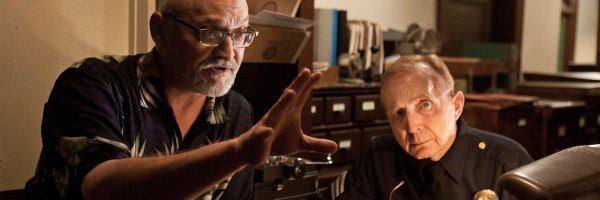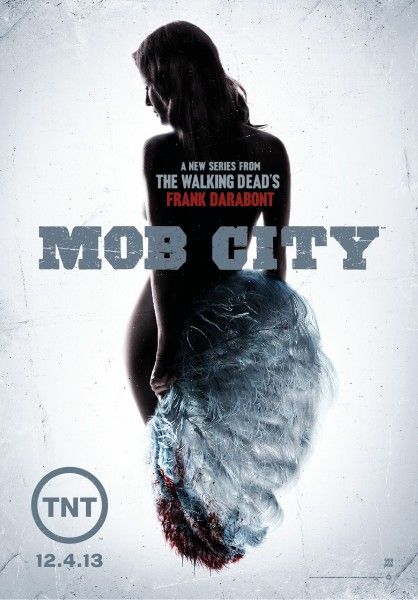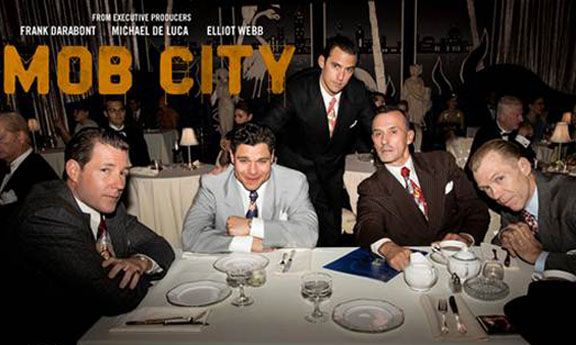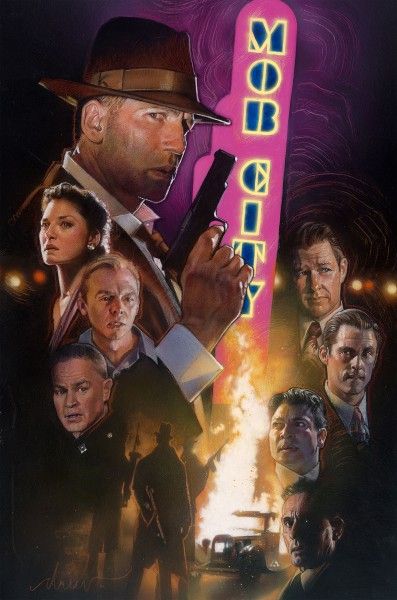From Frank Darabont, the new TNT drama series Mob City depicts the epic battle between a determined police chief and a dangerous mobster, in 1940s Los Angeles. Based on the critically acclaimed book L.A. Noir by John Buntin, the story follows Det. Joe Teague (Jon Bernthal), who has been assigned to a new mob task force headed by Det. Hal Morrison (Jeffrey DeMunn), as part of the crusade by Los Angeles Police Chief William Parker (Neal McDonough) to free the city of criminals like Ben “Bugsy” Siegel (Ed Burns) and Mickey Cohen (Jeremy Luke), and to stop the corruption in his own police force.
During this recent interview to promote the three-week television event that premieres on December 4th, executive producer/writer/director Frank Darabont talked about how he came across the book, what made him want to turn it into a TV series, the appeal of this particular era, finding the right blend of historical accuracy and fiction, and what made Jon Bernthal the guy he wanted to center the story around. Check out what he had to say after the jump.
Question: What initially got you interested in the L.A. Noir book, and what made you decide to flip that interest into this series?
FRANK DARABONT: I was at the newsstand at LAX, before jumping on a plane, and I saw this book called L.A. Noir. Noir is right up my alley, and L.A. is a great component of noir. I grabbed the book thinking that it might actually be some fictional thing, and then wound up realizing, as I was flying, that it was the non-fiction history of this, which actually made the book even cooler to me. I couldn’t put it down for a two days. Once I had read it, I immediately made a call to find out if the rights were available.
It’s just such a fascinating history. It’s utterly absorbing. I couldn’t put the book down. I so recommend the book. John Buntin is just a compelling historian and a brilliantly entertaining writer. So, I checked into the rights, only to discover that my friend Michael De Luca, whom I’ve known since 1986, when I was on my first produced credit as a writer for Nightmare on Elm Street III. I’ve known him all these years. I call him up to find out what he wanted to do with it, and he was excited about my interest, so we decided to partner up on it. It’s been a real pleasure to work with Mike, after all these years.
What was the appeal of this era for you, and why do you think the 1940s were a more dangerous and sexy time?
DARABONT: It certainly seems to me that it was, but then I’ve always had a tremendous appreciation for past eras. I’ve always had a very keen appreciation for this era in the 40s. There was something very sexy and dangerous about it. Plus, it was a much more put together era. It was much more elegant, and people would dress a certain way. They didn’t just walk out of the house wearing their underwear, or whatever people wear these days. They had to put thought into it. They presented themselves well. That’s a wonderful thing to put on film because everyone just winds up looking so of the era, but also just of a different world.
Visually, it’s as unique as a science fiction movie because it was such a different world then. I’ve always loved it. I love the clothes. I love the cars. I love the music. It’s a wonderful period to depict. It’s challenging, of course, because L.A. has changed so much, but we’re finding those little corners and those little pockets of the old stuff. Then, thankfully, with some careful digital trickery and effects, we can enhance the era and make it ever more convincing. I love it. I’ve always loved the noir genre because it’s got an air of dangerous stakes and desperation. Everybody’s got an angle, and there are dangerous women. You don’t know if they’re on your side or not. I always have loved that kind of storytelling, and it’s just a pleasure to roll around in it.
This is partly based on true events and partly fictionalized. How did you decide to frame it for television?
DARABONT: It’s an excellent question because this is honestly the loosest adaptation I’ve ever done. It’s not in any way to disregard John Buntin's book because it really is the inspiration for everything. It’s a really good book, and definitely our touchstone. But, I gave myself license, very early on, to just make up as much of what I felt we needed to make up to tell the most entertaining, good, meaty mob story with pulpy, good, noir stuff. That’s the promise that I wanted to deliver on, and not turn it into the Masterpiece Theater docudrama version of events. We’ve thrown caution to the wind on this one, and John seems to be definitely enjoying the fact that we’ve done that. So, we’re weaving fictional elements into the non-fiction historical elements and having a blast doing it.
Even though this is a fictional telling of the story, were there any particular elements that you really wanted to make sure to keep historically accurate?
DARABONT: Well, even in our historical accuracy, we’re taking liberties. I always say, “Thank god, it’s not a documentary. Certainly, on a very basic level and on a core level of what John Buntin wrote, and what we’re going to be telling, really focusing on the mob versus the police and coming down to the story of Mickey Cohen versus William Parker. John did a brilliant job of distilling everything to that dynamic because it really was the fulcrum point of so many events and the entire power struggle, with those two men butting heads. That’s very much in the long game of the show. I wanted to be very accurate with the fact that Mickey Cohen rises to prominence as the head of the L.A. mob, very much around the time, or not too long later, that William Parker rises to the head of the L.A.P.D. Suddenly, you’ve got these two guys who are running their shops, top of the show in their worlds, and their worlds conflict. That’s a really fascinating set up for storytelling, and John Buntin really delineated that so beautifully in his book.
What was it that made you know Jon Bernthal would be so right for this?
DARABONT: The first time I worked with Jon, I had the thought in my head, “If I ever get to do a noir project, I’m going to want him to play my noir hero. I’m going to want him to play my lead.” He’s got that very period feel to me. He doesn’t come off as a contemporary guy. Plus, he’s got this tremendously quiet, masculine way about him that’s not forced. It’s not showboat. He’s got this very testosterone kind of masculinity that’s quiet and genuine, and it feels like such a throwback to me, to Robert Mitchum and John Garfield, and actors of an earlier era, who came up in tougher circumstances during the Great Depression and fought in those wars, and just had to go out and get through life, as best they could, without making a big deal out of it. He so reminds me of those guys, and those generations. So for me, it was just a self-evident marriage of a certain kind of story that I wanted to tell, and this actor who would be so perfect to tell that story.
Mob City premieres on TNT on December 4th.




